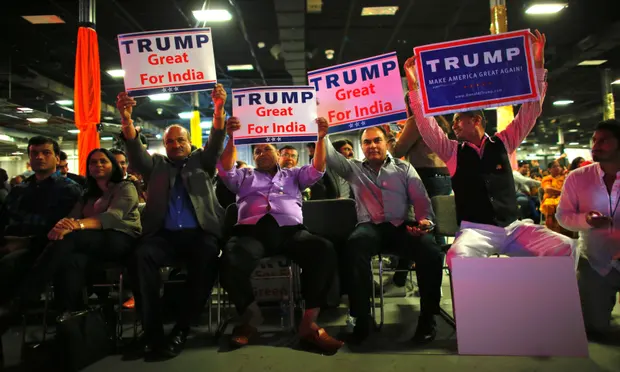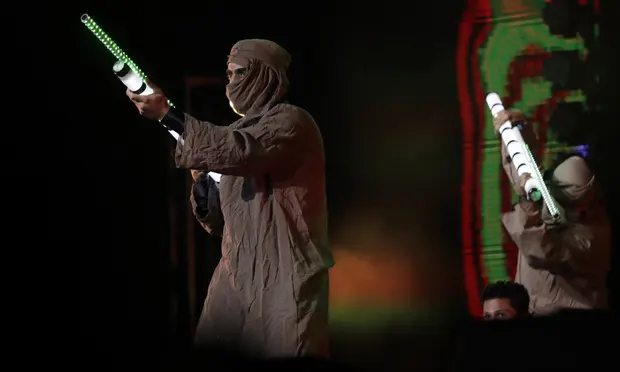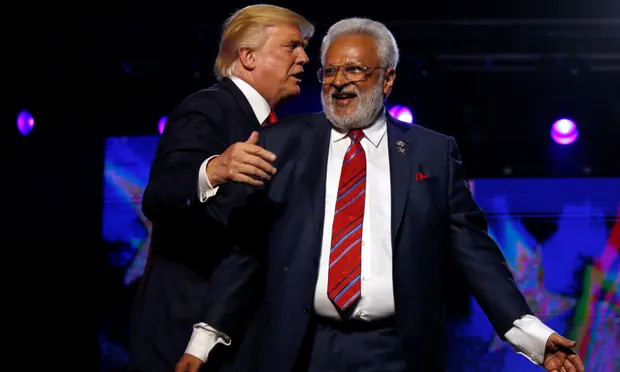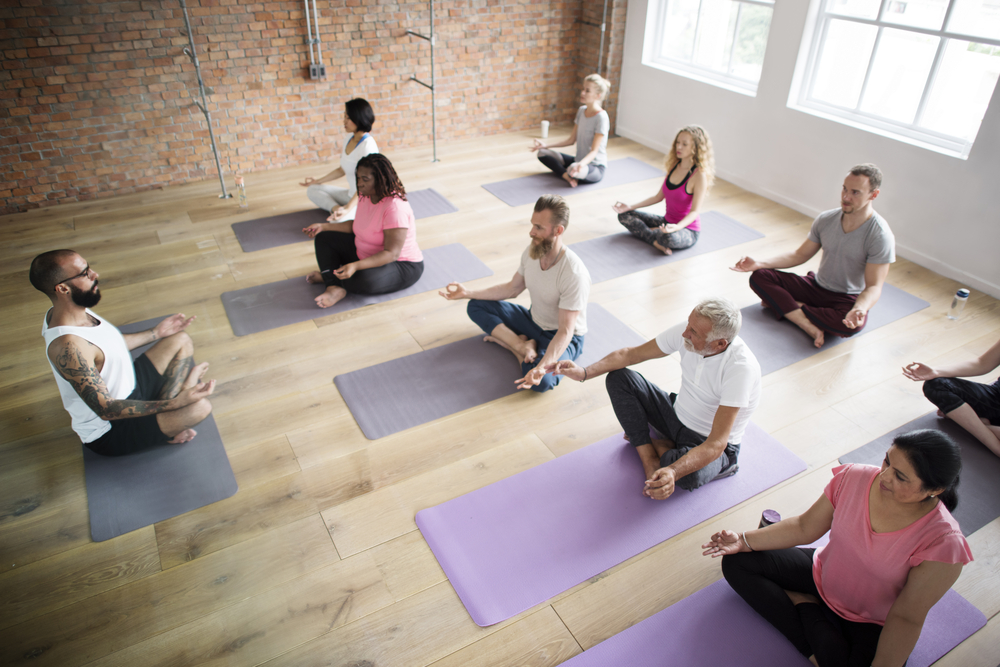Hindu nationalists have rallied behind Donald Trump’s stances on terrorism and immigration, but many South Asians reject an association with the Republican
To a South Asian onlooker, this could have been a scene from any other Desi function on a Saturday night. The booming Bollywood music beckoned a stream of families, wearing ornate saris and sharp kurtas, fragrant plates of samosa chaat in hand, toward the stage, replete with an extravagant display of lights and visuals.
But among the convivial crowds also stood a white man wearing a baseball cap and shirt that read “Hillary for Prison”. The placards waiting on empty seats called out “Trump for Hindu Americans” and “Trump Great for India”. Everyone was waiting for Donald Trump.
Three weeks before the election, Trump made a brief but rousing appearance at the Republican Hindu Coalition’s (RHC) Humanity United Against Terror charity concert, an event framed around raising money to combat “radical Islamic terrorism”, particularly for Hindus from Bangladesh and Kashmir.
“I’m a big fan of Hindu, and I’m a big fan of India,” Trump told hundreds of enthusiastic attendees in Edison, New Jersey, a town known for its sizable South Asian population.
Terrorism made for a dissonant theme on a night filled with several upbeat music and dance performances by Indian choreographer Prabu Deva and Signature, the dance group known for competing on Britain’s Got Talent.
The introduction to the national anthem featured a simulated terrorist attack, in which two couples dancing on stage were suddenly attacked by two men covered in brown cloth, who were shouting and wielding toy guns with green lightsabers attached. Men dressed as US Navy Seals entered to defeat the terrorists. They all stood together for the Star-Spangled Banner before dancing to Bruce Springsteen’s Born in the USA.
Trump, after lighting Diwali lamps onstage with the RHC’s founding chairman, Shalabh “Shalli” Kumar, said: “The Indian and Hindu community will have a true friend in the White House.
“Generations of Hindu and Indian Americans have strengthened our country,” he said. “Your values and hard work, education and enterprise, have truly enriched our nation.”

The Republican nominee went on to praise the Indian prime minister, Narendra Modi, as a “great man” and confused the 2001 Indian parliament attack with the 2008 Mumbai attacks in his pledge to fight terrorism.
“We will stand shoulder to shoulder with India and share intelligence in keeping our people safe mutually,” he said.
The RHC supports Trump’s stances on immigration and terrorism, including his “extreme vetting” policy on incoming refugees, said Kumar, a businessman originally from Punjab.
“The Islamic extremist terrorists have declared a war on us. They have declared they will use every possible means to infiltrate into the US through refugees coming in who have nothing but a piece of paper with their name and not even a passport or birth certificate,” Kumar told the Guardian. “We should also monitor the mosques throughout the US and wherever the centers of this type of activity exist.”
Kamal Singh of Edison, New Jersey, said he believed Trump, who he referred to as “the big leader”, will stand with India in fighting terrorist organizations from Pakistan.
“Trump is for peace and he’s fighting against terrorism,” Singh said.
Trump refrained from overt critique of ongoing tensions in an interview with Hindustan Times: “I would love to see Pakistan and India get along because that’s a very, very hot tinderbox.”
The RHC plans to donate half of the event’s proceeds to Hindu refugees from Bangladesh and Kashmiri Hindus, known as Hindu pandits, who underwent what Kumar called “the second Hindu holocaust”, the first being Partition after India’s independence in 1947 from British colonial rule, he said.

“They were very prominent, very educated, highly intellectual people who had to leave their homes and become refugees. The plight has been somewhat forgotten under political correctness” of the Indian government, Kumar said.
In the 1990s, about 100,000 Hindu pandits in the Muslim-majority state of Kashmir fled from a separatist uprising in response to frustrations with the Indian government’s treatment of Kashmir and its people.
The charities that will receive the donations have not yet been decided, but Kumar said the RHC will consult Kashmiri Hindu actor Anupam Kher and the Indian government for guidance.
Inspired by the Republican Jewish Coalition, the RHC formed in November 2015 “to provide a single, unified platform for Hindu Americans to have a respected voice on the policy table in the United States as well as India”, said Kumar, who considers himself the first Indian American Republican after meeting Ronald Reagan in 1979.
Kumar said Hindu Republicans, who make up about 13% of the Hindu American population, align with Trump on four major policy principles: free enterprise with small government, fiscal discipline with a constitutional amendment to eliminate deficits, legislation that upholds the “traditional” family unit, and a firm foreign policy stance against terrorism.
“I always say as a Hindu, I have two targets on my head: one for being Hindu and the second because I’m an American,” Kumar said.

“Donald Trump will be the most pro-India, pro-Hindu, pro-Bharat president in the history of the United States,” Kumar said, using another name for India that Modi’s Hindu nationalist Bharatiya Janata party defines as “the ancient word for the motherland of Hindus”.
For Hindu nationalists, Trump models what it takes to be an American success, said Arvind Rajagopal, a media studies professor at New York University.
“Like the American right, Hindu nationalists combine religious conservatism with the unbridled pursuit of success,” said Rajagopal, author of Politics After Television: Hindu Nationalism and the Reshaping of the Public in India. “Hindu nationalists want to make India great again.”
Hindu nationalism is rooted in the belief that Muslim and British invasions defiled Hindu culture and values, which are seen as synonymous with those of India, writes Syracuse professor Prema Kurien in her book A Place at the Multicultural Table: the Development of an American Hinduism.
The ideology resurged amid the post-independence violence of Partition, in which hundreds of thousands of Hindus, Muslims and Sikhs were killed in the largest mass migration in history. Hindu nationalists alleged discrimination against the newly established secular government, claiming a sense of religious superiority and uniqueness, Kurien writes.
With the rise of the BJP in the 1980s and Modi’s election as prime minister in 2014, Hindu nationalism has become further entrenched in India, where Muslims have been killed merely upon suspicion of eating or smuggling beef.
Over the summer, Hindu nationalists in India performed ceremonial rituals for Trump in the hopes that their worship would help him get elected, so he can “put an end to Islamic terrorism”.
“The Hindu community has always believed that the world is one family,” said spiritual leader Sri Sri Ravi Shankar in a prerecorded message during the New Jersey event. “The Hindu community of North America has always been kind-hearted, peace-loving, and always ready to contribute for charity and development of America.”
Kumar echoed the message of Hinduism as a tolerant and accepting religion that promotes spirituality.
“You could be atheist and still be a Hindu because Hinduism is a way of life rather than a traditional religion with one prophet or one god or one book,” he said.
But many South Asians, appalled by the event’s Islamophobic and xenophobic undertones, mobilized through protests and social media to challenge the growing alliance between Hindu nationalism and rightwing American politics.
“This isn’t just isolated to Trump,” said Thenmozhi Soundararajan, a member of the Alliance for Justice and Accountability (AJA), a coalition of progressive South Asian groups. “This is about the nexus of Hindu fundamentalism finding a home with Republicans who are using a very real fundamentalism in the US to fight the bogeyman of Islam.”
Soundararajan criticized how the RHC framed violence in Kashmir as a conflict that pits the aggrieved Hindu victim against Islam in a disputed territory embroiled in an ongoing struggle for self-determination.
“This event is erasing the reality of Kashmir’s occupation by India and elevating the story of Kashmiri pandits over the many who were attacked by the Indian military this summer,” she said. “This is part of the culture of silence and impunity that leads to Kashmir’s ongoing occupation.”
Soundararajan said Kumar, who has donated nearly $900,000 to Trump’s campaign and maintains close ties to Republican party leaders such as Paul Ryan and Newt Gingrich, works to justify GOP policies from a South Asian perspective.
“Kumar is the acceptable brown Asian,” she said. “He helps ‘brown-wash’ these larger Islamophobic and xenophobic positions toward Muslims and other immigrants.”
The AJA launched a social media campaign called #SouthAsiansDumpTrump to rally South Asian Americans to denounce the event’s anti-Muslim sentiments and to call out members of the Desi community who support Trump.
Soundararajan said the event’s celebration of Diwali suggested that attendees were mostly upper caste, thus excluding South Asian communities who have been marginalized by the caste system, which places people into a hierarchy based on birth and has been used to oppress lower caste and Dalit communities in India and the diaspora.
“Diwali and Dussehra are both upper-caste holidays that celebrate the death of tribals and the ascent of Aryan culture over Dravidian culture,” said Soundararajan, a Dalit American artist and activist. “In many ways Dalit communities do not celebrate this event – it’s literally about the killing of our people.”
Roshni Bhambhwani, a museum professional living in Niskayuna, New York, organized the protest because she said people needed to see Hindu Americans who were against Trump.
“I wanted [event attendees] to feel ashamed that they went to see this man who is clearly a misogynist and has sexually assaulted and harassed women and who, frankly, probably couldn’t care less about them,” she said.
A small group of mostly South Asian demonstrators were confronted by Trump supporters outside the venue after the Republican nominee’s speech.
Mostly white men surrounded protesters and shouted racist and Islamophobic slurs and anti-Hillary Clinton chants while moving in closer, said Sudip Bhattacharya.
“I’ve been involved in protests before, but this is the first time I was actually scared at a rally, and I’ve faced racism before,” said Bhattacharya, a PhD student from Monroe, New Jersey.
Dedunu Suraweera said Hindu Trump supporters approached them to talk directly about their opposing perspectives.
“They would say things like, ‘Well we don’t want these people bombing our countries so we shouldn’t let them in. There’s too many Muslims threatening the safety of the country.’ And then tying it back to India,” she said. “So there was a lot of conversation with them about why that was messed up.”
Suraweera, an educator from New York City who regularly visited Edison growing up, said she found it impactful to be able to speak directly to Hindus in the community.
“It’s important for South Asians to see resistance in this way,” she said. “I don’t know any other time in terms of South Asian organizing where I experienced us challenging the values and beliefs of our own people in our actual communities … For me it was really powerful to be there and to show that we exist and we resist this rhetoric.”
This article first appeared in The Guardian





